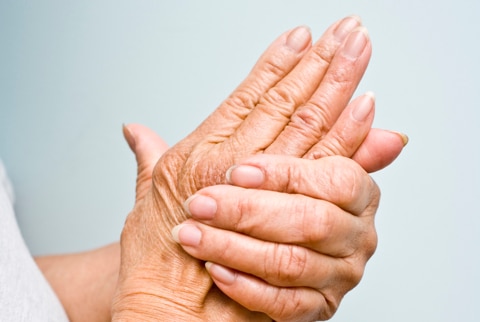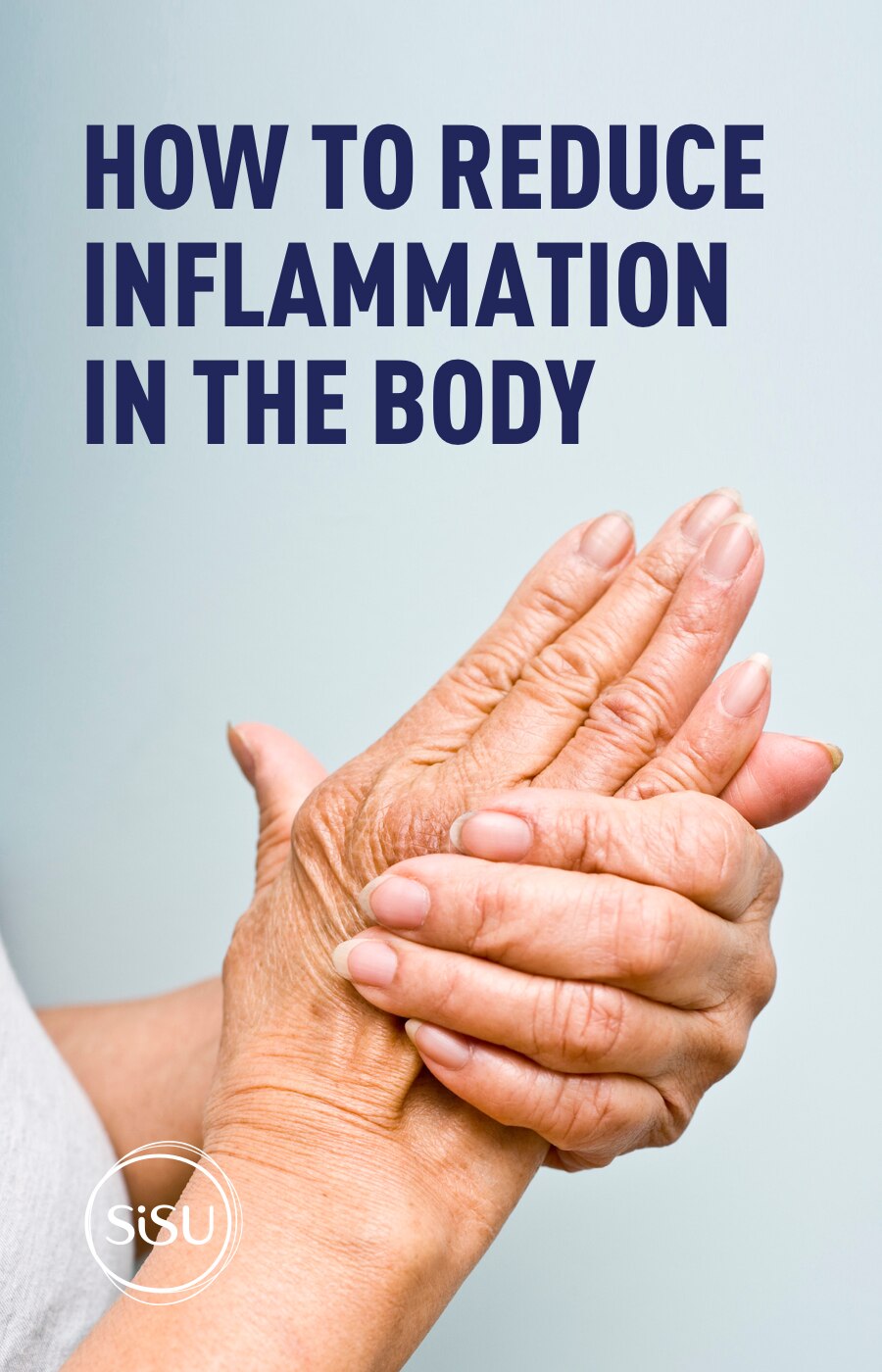
What causes inflammation?
Inflammation is commonly thought to be an unhealthy condition that should be avoided – yet, not all inflammation is bad! In fact, without it, we wouldn’t be able to heal from injuries, build muscle, or fight off infection.1
This ‘good’ inflammation is called acute inflammation. If you’ve ever had trouble standing up or even walking the day after an intense workout, you know exactly how acute inflammation feels.
Banging your knee or twisting your ankle also triggers this natural inflammatory response. While this kind of inflammation is healthy and natural, there’s another kind of inflammation that can lead to health risks.
Chronic inflammation occurs slowly over time and can be caused by various lifestyle habits such as smoking, stress and sleep disorders, and eating a diet rich in saturated fats, trans fats, or refined sugar.2 As the name states, chronic inflammation happens slowly over time.3
The difference between acute and chronic inflammation
Our bodies require acute inflammation, it’s chronic inflammation that poses a threat to our health.
When inflammation responses are continually triggered (known as chronic inflammation) the body is more susceptible to developing diseases such as cancer, diabetes, arthritis, depression, heart problems, and Alzheimer’s.4
During acute inflammation, your body signals the immune system to release a swarm of white blood cells which rush to the area of impact. These cells jump in to protect your body from tissue damage, bacteria, and viruses.5
If acute inflammation is a sprint to assist, chronic inflammation is a marathon to disease.
For example, atherosclerosis is a chronic inflammatory and immune disease that targets the arteries.6 Overtime chronic inflammation causes the buildup of fatty, cholesterol-rich plaque in the arteries. Your body sees this plaque as a risk and attempts to wall off the plaque from the flowing blood. However, if that wall breaks down, the plaque can rupture and form with the blood, making a clot that blocks blood flow. In many cases, these clots are what causes heart attacks and strokes.7
How to reduce inflammation
The best lifestyle habits to reduce chronic inflammation are the ones that combat stress or help your body cope with stressors in a manageable and healthy way, as studies suggest that prolonged stress can contribute to inflammation.8
Lifestyle habits that reduce stress and inflammation:
- Laughter has been shown to reduce stress9
- Gratitude can help lower the levels of C-reactive protein—a compound associated with being a marker of cardiac inflammation10
- Meditation has also been shown to reduce the genetic markers of inflammatory diseases11
- Exercise—20 minutes of moderate movement is all it takes to stimulate the immune system to produce an anti-inflammatory cellular response12
- Plant-based diets have been shown to reduce biomarkers of inflammation and oxidative stress.13
Lifestyle habits are a good way to prevent chronic illness and promote a healthy vibrant life. In addition, introducing nutrient-rich foods with anti-inflammatory and antioxidant nutrients is just as important.
Anti-inflammatory nutrients
Anti-inflammatory agents are powerful, natural agents that can help reduce inflammation or swelling in the body.14 These compounds have anti-inflammatory abilities:
- Vitamin C has been shown to help treat and reduce inflammation.15
- Curcumin — found in turmeric — has anti-inflammatory and antioxidant properties.16
- Gingerol — the main bioactive compound in ginger — has anti-inflammatory effects.17
- Capsaicin — found in cayenne. One study found that capsaicin produced anti-inflammatory effects that were comparable to diclofenac (an anti-inflammatory drug used to treat pain and inflammatory diseases).18
- Boswellic acid — found in the herb boswellia — Research suggests boswellic acid can help support the management of several chronic inflammatory diseases such as asthma, Crohn’s disease, and psoriasis.19
- Salicin — found in white willow — is chemically related to aspirin and has shown to have anti-inflammatory effects.20 21
Anti-inflammatory foods
Incorporate the following foods and herbs into your diet to get the benefits of the nutrients above:
- Fruits and veggies that are rich in vitamin C (citrus fruits, berries, broccoli, and bell peppers.)
- Turmeric – this herb can be grated and added to smoothies, soups, and oatmeal. The powder form can be added to any meal or drink.
- Ginger – grate this herb and add to a stir fry, smoothies, oatmeal, and fresh juices.
- Cayenne pepper – add to a stir fry, soup, and hot chocolate.
- The herb, boswellia – the resin of the boswellia tree can be made into a tea.
- White willow bark can be made into tea.
Other foods that contain anti-inflammatory nutrients include:22
- Tomatoes
- Leafy green vegetables
- Nuts
- Fish
- Berries and oranges
Curcumin supplement
Turmeric contains the compound curcumin which is known for its antioxidant properties.23 Antioxidants are substances that can help support the protection of cells against harmful free radicals.24
One of the challenges with curcumin is its poor bioavailability — the body has difficulty absorbing it.25 You can get more of this antioxidant by taking Sisu’s Full Spectrum Curcumin.
Learn more about Sisu’s Full Spectrum Curcumin.
 Anti-inflammatory supplements
Anti-inflammatory supplements
Taking supplements that include anti-inflammatory compounds is an easy way to get more supportive nutrients in your diet.
Look for a supplement that contains the health compounds mentioned above — vitamin C, turmeric, ginger, cayenne, boswellia, or white willow. All of these nutrients and superfoods can be found in Sisu No. 7 — which helps support joint function and joint pain relief.
Together, healthy lifestyle habits, nutrient-rich foods, and premium supplements can help keep you active and enjoying life to the fullest.
Stay in the loop! Get more health and wellness information and healthy lifestyle tips by following Sisu on Instagram.
These products may not be right for you. Always read and follow the label.
If you have a chronic inflammatory health problem, please seek help from a healthcare practitioner. Always check with a healthcare practitioner before taking a nutritional supplement. These recommendations are for informational and educational purposes only.
1 https://www.shape.com/fitness/tips/how-use-post-workout-inflammation-your-advantage
2 https://www.ncbi.nlm.nih.gov/books/NBK493173/
3 https://www.ncbi.nlm.nih.gov/books/NBK493173/
4 https://www.health.harvard.edu/staying-healthy/foods-that-fight-inflammation
5 https://www.health.harvard.edu/heart-disease-overview/ask-the-doctor-what-is-inflammation
6 https://www.ncbi.nlm.nih.gov/pmc/articles/PMC4655391/
7 https://www.health.harvard.edu/heart-disease-overview/ask-the-doctor-what-is-inflammation
8 https://www.ncbi.nlm.nih.gov/pmc/articles/PMC5476783/
9 https://www.mayoclinic.org/healthy-lifestyle/stress-management/in-depth/stress-relief/art-20044456
10 https://health.ucdavis.edu/medicalcenter/features/2015-2016/11/20151125_gratitude.html
11 https://www.biologicalpsychiatryjournal.com/article/S0006-3223%2816%2900079-2/fulltext
12 https://health.ucsd.edu/news/releases/Pages/2017-01-12-exercise-can-act-as-anti-inflammatory.aspx
13 https://www.pcrm.org/news/health-nutrition/plant-based-protein-decreases-chronic-inflammation
14 https://www.cancer.gov/publications/dictionaries/cancer-terms/def/anti-inflammatory-agent
15 https://www.ncbi.nlm.nih.gov/pmc/articles/PMC4492638/
16 https://www.unitypoint.org/livewell/article.aspx?id=2d07f077-1a67-4ba4-91bd-5589d76382e5
17 https://www.ncbi.nlm.nih.gov/pmc/articles/PMC6073224/
18 https://www.ncbi.nlm.nih.gov/m/pubmed/24235936/
19 https://www.sciencedirect.com/science/article/pii/S2221169117304914
20 https://www.sciencedirect.com/topics/neuroscience/salicin
21 https://www.sciencedirect.com/topics/medicine-and-dentistry/salicin
22 https://www.health.harvard.edu/staying-healthy/foods-that-fight-inflammation
23 https://www.ncbi.nlm.nih.gov/pubmed/17569207
24 https://www.mayoclinic.org/healthy-lifestyle/nutrition-and-healthy-eating/multimedia/antioxidants/sls-20076428
25 https://academic.oup.com/advances/article/9/1/41/4848948



